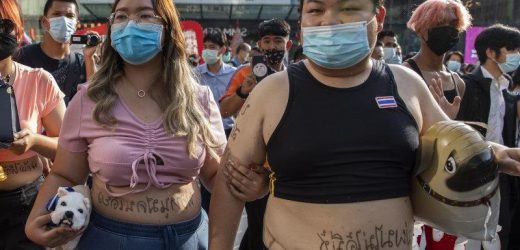Singapore: He is among the best known faces of a youth-driven pro-democracy movement that drew hundreds of thousands of people to the streets of Thailand last year, sporting the three-finger salute popularised by The Hunger Games film franchise to protest the power of the country’s king.
Now, 45 days into a hunger strike begun after he was denied bail while awaiting trial on lèse-majesté, or royal defamation charges, the condition of student activist Parit “Penguin” Chiwarak has deteriorated to such an extent his lawyers fear it may be life threatening.
Protest leaders Parit Chiwarak and Panusaya Sitthijirawattanakul at a protest in Bangkok last December.Credit:Getty Images
“He can’t actually walk upstairs by himself now. He has to be escorted,” Thai Lawyers for Human Rights co-founder Sirikan Charoensiri told The Sydney Morning Herald and The Age on Thursday before the latest attempt by his legal team and family to obtain bail at the Bangkok Criminal Court.
“This morning my team, who just came out from seeing him, said he felt very weak and he started to faint several times.”
Parit, 22, announced on March 15 that he would be refusing food until he was granted bail, telling the court he did not intend to take his own life but hoped “the torment that happens to me is a testimony to the injustice that has occurred, a spark that pricks your conscience and serves as proof that the truth is not afraid of any suffering whatsoever”.
He has since been put on a saline drip and arrived to court last month in a wheelchair as his health began to decline.
Sirikin is representing fellow student protest leader Panusaya “Rung” Sithijirawattanakul, who has also embarked on a hunger strike in prison after being charged with insulting Thailand’s billionaire King Maha Vajiralongkorn while calling for change to the constitution and the monarchy and for the resignation of Prime Minister Prayut Chan-o-cha. Prayut came to power via a military coup in 2014.
During demonstrations last year, Parit and other protest leaders wore crop tops, a garment the king has been photographed wearing in Germany.
“Her condition is not as bad as Penguin’s because he started [a hunger strike] earlier,” Sirikin said of Panusaya, who is also 22. “But Rung has lost weight, about 10 kilos to 12 kilos, and she is quite concerned about the spread of COVID-19 and the living conditions in the prison.”
Parents of the two student protesters and those of five others detained under similar charges gathered outside court in Bangkok on Thursday.
Pro-democracy activists gesture with a three-fingers salute, a symbol of resistance, as they arrive at the Attorney-General’s office in Bangkok, in March.Credit:AP
“It has become a trend for Thai authorities to use pre-trial detention to punish pro-democracy activists who spoke out about the king, about the need to reform the monarchy and they have been put in jail without a court verdict.
While Parit and Panusaya are on multiple charges over their roles in last year’s protests, Thailand’s draconian lèse-majesté laws carry a prison term of up to 15 years for each offence.
Their hunger strikes had by Thursday not had any impact on judges, who have repeatedly refused them bail while they prepare their defence.
“Regardless of strong criticism in Thailand and from the international community the Thai authorities seem to be unswayed and especially in the case of Penguin and Rung, who have been on hunger strikes for a long period of time. It hasn’t changed. Bail has been denied repeatedly,” said Sunai Phasuk, senior researcher on Thailand in Human Rights Watch’s Asia division.
HRW has tallied at least 82 people charged with lèse-majesté over the protests, including a woman who was in January imprisoned for 43 years.
“That set a new record in terms of the jail term in lèse-majesté cases,” Sunai said.
“It showed that speaking out against the king is not just going to be punished but the punishment will be meted out to the extreme. That’s the message.”
Protesters began using the three-finger salute in opposition to the coup in Thailand seven years ago and the gesture has since been adopted by other activists in the region, most recently in Myanmar, where the new military regime has cracked down violently against a civil disobedience movement, killing more than 750 people since its February 1 coup.
What in the World
A note direct from our foreign correspondents about what’s making headlines around the world. Sign up for our weekly newsletter here.
Most Viewed in World
From our partners
Source: Read Full Article




